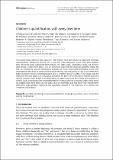Children’s quantification with every over time
Author(s)
Aravind, Athulya; De Villiers, Jill; De Villiers, Peter; Lonigan, Christopher J.; Phillips, Beth M.; Clancy, Jeanine; Landry, Susan H.; Swank, Paul R.; Assel, Michael; Taylor, Heather B.; Eisenberg, Nancy; Spinrad, Tracy; Valiente, Carlos; ... Show more Show less
Download166-5156-1-PB.pdf (581.6Kb)
Publisher with Creative Commons License
Publisher with Creative Commons License
Creative Commons Attribution
Terms of use
Metadata
Show full item recordAbstract
This article looks closely at two types of errors children have been shown to make with universal quantification—Exhaustive Pairing (EP) errors and Underexhaustive errors—and asks whether they reflect the same underlying phenomenon. In a large-scale, longitudinal study, 140 children were tested 4 times from ages 4 to 7 on sentences involving the universal quantifier every. We find an interesting inverse relationship between EP errors and Underexhaustive errors over development: the point at which children stop making Underexhaustive errors is also when they begin making EP errors. Underexhaustive errors, common at early stages in our study, may be indicative of a non-adult, non-exhaustive semantics for every. EP errors, which emerge later, and remain frequent even at age 7, are progressive in nature and were also found with adults in a control study. Following recent developmental work (Drozd and van Loosbroek 2006; Smits 2010), we suggest that these errors do not signal lack of knowledge, but may stem from independent difficulties appropriately restricting the quantifier domain in the presence of a salient, but irrelevant, extra object.
Date issued
2017-05Department
Massachusetts Institute of Technology. Department of Linguistics and PhilosophyJournal
Glossa
Publisher
Ubiquity Press, Ltd.
Citation
Aravind, Athulya et al. "Children’s quantification with every over time." Glossa: a journal of general linguistics 2, 1 (May 2017): 43. 1–43.16 © 2017 The Author(s)
Version: Final published version
ISSN
2397-1835